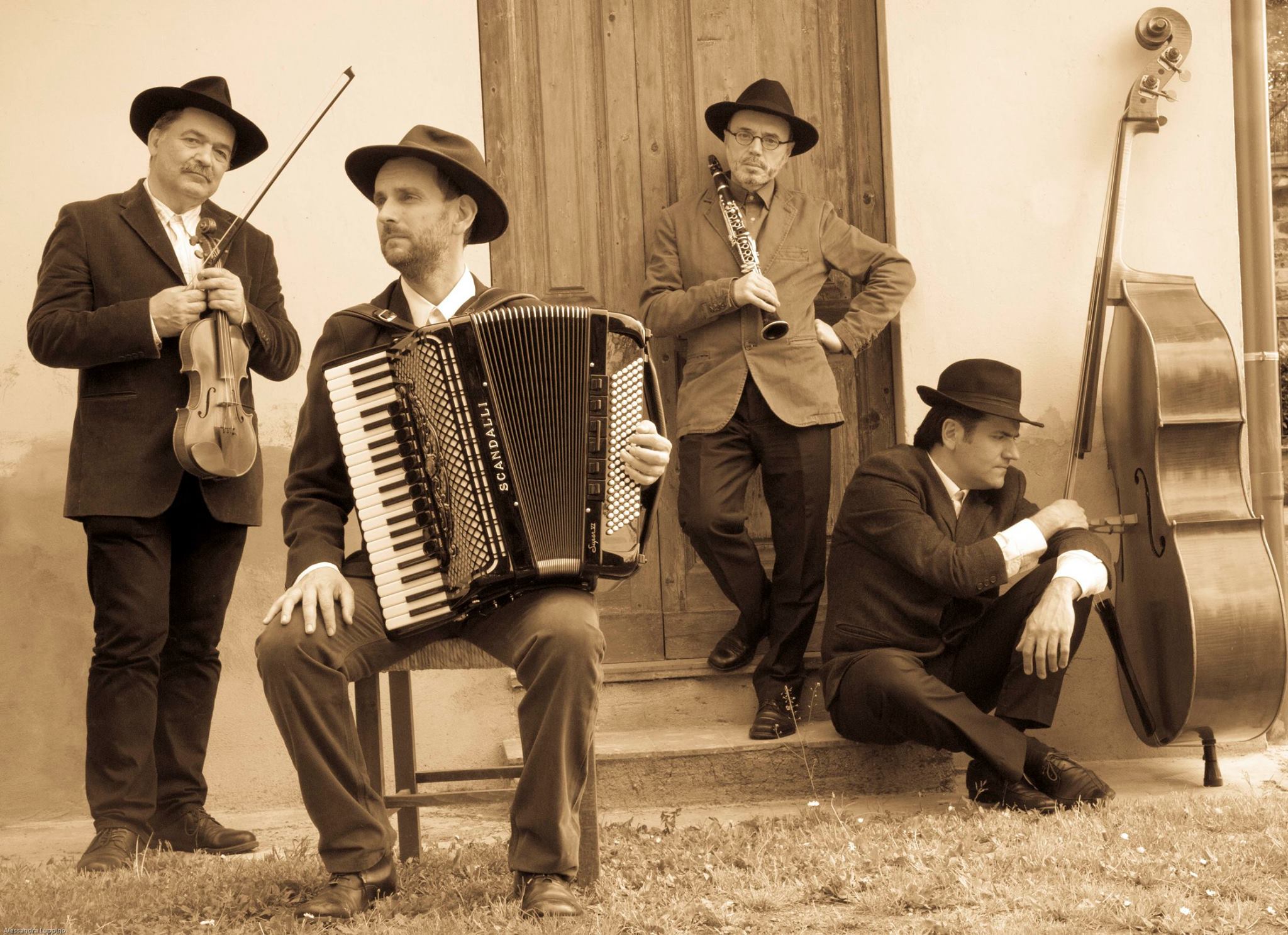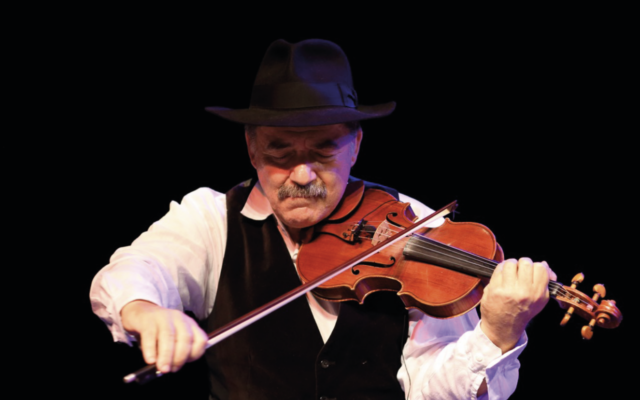Klezmerata Fiorentina: traditional music doesn’t get more authentic than this
Igor Polesitsky, who learnt klezmer from his grandmother’s voice as well as from one of the greatest classical and Yiddish violinists in his native Ukraine, is bringing his virtuoso quartet to London
Seven of Britain’s best-loved classical actors plus Prince Charles (as he was) took part in a comic sketch at the RSC a few years ago on the anniversary of Shakespeare’s death. As each walked on stage he or she earnestly gave the others a different account of where the stress in a certain line from Hamlet should be put. This week the Ukrainian string player Igor Polesitsky used the same line to show me that klezmer music is all about intonation. He saturated it with Yiddisher rhythm and playfulness and we both laughed heartily. “To be or not to be, that is the question” has surely never sounded so Jewish or, arguably, so intriguing.
Igor will bring his playing and his playfulness to London next week when Klezmerata Fiorentina, the band he formed in 2005, has its debut gig in the city. The ensemble is formed of virtuoso players from the esteemed Orchestra del Maggio Musicale Fiorentino, currently under the baton of Daniele Gatti, and where he was principal violist. Reaching 62 a few years ago meant mandatory retirement for Igor. “I’m very happy this way. I find it good,” he says. Now it means that as far as his music goes, he has “completely decided to dedicate myself to my Yiddish studies, to the Jewish side of my soul”.
Yiddish was the language of his grandparents in his native Ukraine, and his grandmother was a big influence on him as a violinist, despite not playing herself. He started on the instrument aged six and one of the ways he would learn was from his grandmother’s voice. She would sing to him and he would play to her. “She said, ‘No, no, no, not like this’,” Igor says, almost incredulously. “I was playing the way I was taught by a very good classical teacher in a music school. And she said, ‘No, no, no, no, no, no, no, no, no.’ And so finally I tried to do the way she was singing exactly. And she said, ‘Yes, that’s it.’ She said, ‘You’re trying to sing like an opera. You have to speak. You have to talk. Du muzt efes zagn.’”
He recalls: “We had few relatives that survived the Holocaust, so we had a very, very small family, but when they would come, I would have to perform that. I understood right away that it’s a very different way of dealing with music. It’s a very different intonation.”
Another of Igor’s big influences was the great violinist Abram Shtern, one of his teachers at the Kyiv conservatoire. Most of what Igor learnt from Shtern was classical but he says when he heard his master play klezmer for the first time he was “absolutely flabbergasted”. Shtern showed him techniques that otherwise you can only imitate from a recording, Igor says; his teacher also represented a link to Leopold Auer, who had taught Jascha Heifetz himself.

While Igor himself had always played klezmer, he created Klezmerata in response to an invitation from a friend to take part in a festival in Lugano, in Switzerland, dedicated to different aspects of Jewish music. Igor said he wanted to play some authentic klezmer, without singers, and he realised he needed a band. “So I went to these three guys who are totally Italian Catholics, and never had anything to do with Jewish culture or Yiddish music, but they wanted to do it.” He smiles again.
“We don’t imitate. We don’t take the old recordings and just try to imitate that. We started with trying to dig out the sense, the meaning of the note and rhythm of these tunes.” They used the archive of Moyshe Beregovsky, the great ethnomusicologist in Kyiv who collected Jewish music in Ukraine, building on a collection that had already been started by An-sky (Shlomo Zanzvil Rappoport) and Susman Kiselgof before the revolution. That collection was moved to Kyiv in 1920s and 1930s, becoming the Institute of Jewish Culture in the Academy of Sciences of Ukraine. By the end of the 1930s the promotion of Yiddish culture was stopped, and then came war.
Over the past nearly 20 years Klezmerata Fiorentina has played across Europe, North America and the former Soviet Union, including at the Quirinale Palace in Rome and the Kremlin. When they played a concert in Los Angeles, Igor’s old teacher Shtern, who emigrated to the United States in 1990, heard them. “I was very, very moved to play for this man and he was very, very happy to hear us,” Igor recalls, beaming broadly. They hope to make their London audience very happy too.
• Klezmerata Fiorentina are at the Cadogan Hall, London SW1, on Monday 19 February 2024. Tickets here or telephone the box office on 020 7730 4500

Thank you for helping to make Jewish News the leading source of news and opinion for the UK Jewish community. Today we're asking for your invaluable help to continue putting our community first in everything we do.
For as little as £5 a month you can help sustain the vital work we do in celebrating and standing up for Jewish life in Britain.
Jewish News holds our community together and keeps us connected. Like a synagogue, it’s where people turn to feel part of something bigger. It also proudly shows the rest of Britain the vibrancy and rich culture of modern Jewish life.
You can make a quick and easy one-off or monthly contribution of £5, £10, £20 or any other sum you’re comfortable with.
100% of your donation will help us continue celebrating our community, in all its dynamic diversity...
Engaging
Being a community platform means so much more than producing a newspaper and website. One of our proudest roles is media partnering with our invaluable charities to amplify the outstanding work they do to help us all.
Celebrating
There’s no shortage of oys in the world but Jewish News takes every opportunity to celebrate the joys too, through projects like Night of Heroes, 40 Under 40 and other compelling countdowns that make the community kvell with pride.
Pioneering
In the first collaboration between media outlets from different faiths, Jewish News worked with British Muslim TV and Church Times to produce a list of young activists leading the way on interfaith understanding.
Campaigning
Royal Mail issued a stamp honouring Holocaust hero Sir Nicholas Winton after a Jewish News campaign attracted more than 100,000 backers. Jewish Newsalso produces special editions of the paper highlighting pressing issues including mental health and Holocaust remembrance.
Easy access
In an age when news is readily accessible, Jewish News provides high-quality content free online and offline, removing any financial barriers to connecting people.
Voice of our community to wider society
The Jewish News team regularly appears on TV, radio and on the pages of the national press to comment on stories about the Jewish community. Easy access to the paper on the streets of London also means Jewish News provides an invaluable window into the community for the country at large.
We hope you agree all this is worth preserving.






















